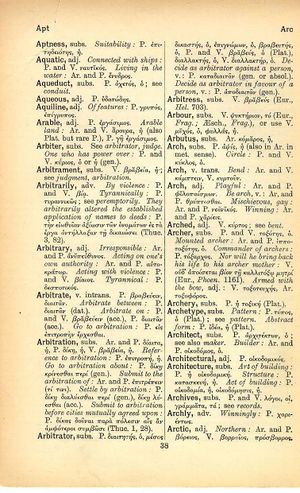arbutus: Difference between revisions
From LSJ
(1) |
m (Text replacement - "(|thumb)\n(\|link=)" to "$1$2") |
||
| Line 1: | Line 1: | ||
{{Woodhouse1 | {{Woodhouse1 | ||
|Text=[[File:woodhouse_38.jpg|thumb | |Text=[[File:woodhouse_38.jpg|thumb|link={{filepath:woodhouse_38.jpg}}]]'''subs.''' | ||
|link={{filepath:woodhouse_38.jpg}}]]'''subs.''' | |||
Ar. [[κόμαρος]], ἡ, | Ar. [[κόμαρος]], ἡ, | ||
Revision as of 17:10, 18 May 2020
English > Greek (Woodhouse)
subs.
Ar. κόμαρος, ἡ,
Latin > English (Lewis & Short)
arbŭtus: i, f. kindr. with arbor, since the arbutus was abundant in Italy,
I the wild strawberry-tree, the arbute, arbutus: Arbutus unedo, Linn.; Ov. M. 10, 102; cf. Verg. G. 2, 69; Col. 7, 9, 6; 8, 10, 4; Plin. 15, 24, 28, § 99; 23, 8, 79, § 151 al.; its fruit, like that of the oak, was anciently the food of men; cf. arbutum. Under it the goats were fond of grazing: dulce satis umor, depulsis arbutus haedis, etc., Verg. E. 3, 82; so Hor. C. 1, 17, 5; and idle men of reposing: nunc viridi membra sub arbuto Stratus, Hor. C. 1, 1, 21.
Latin > French (Gaffiot 2016)
arbŭtus,¹³ ī, f., arbousier : Virg. G. 2, 69.
Latin > German (Georges)
arbutus, ī, f., der Meerkirschen- od. Erdbeerbaum, der Hagapfelbaum (Arbutus Unedo, L.), Verg., Col. u.a.

